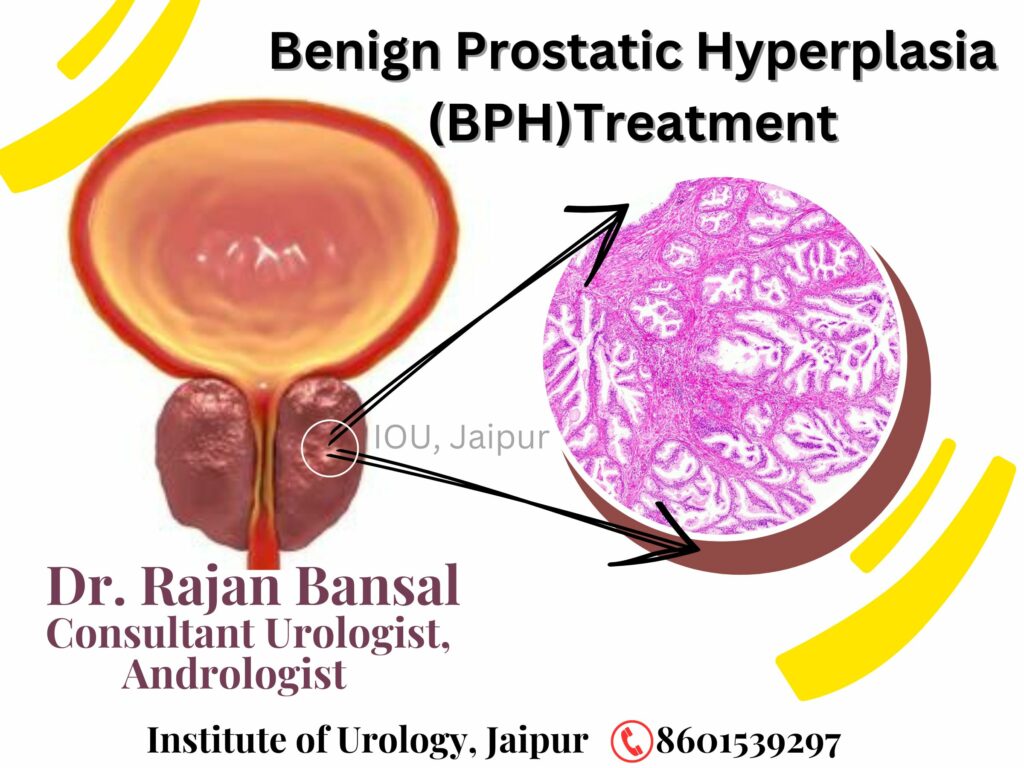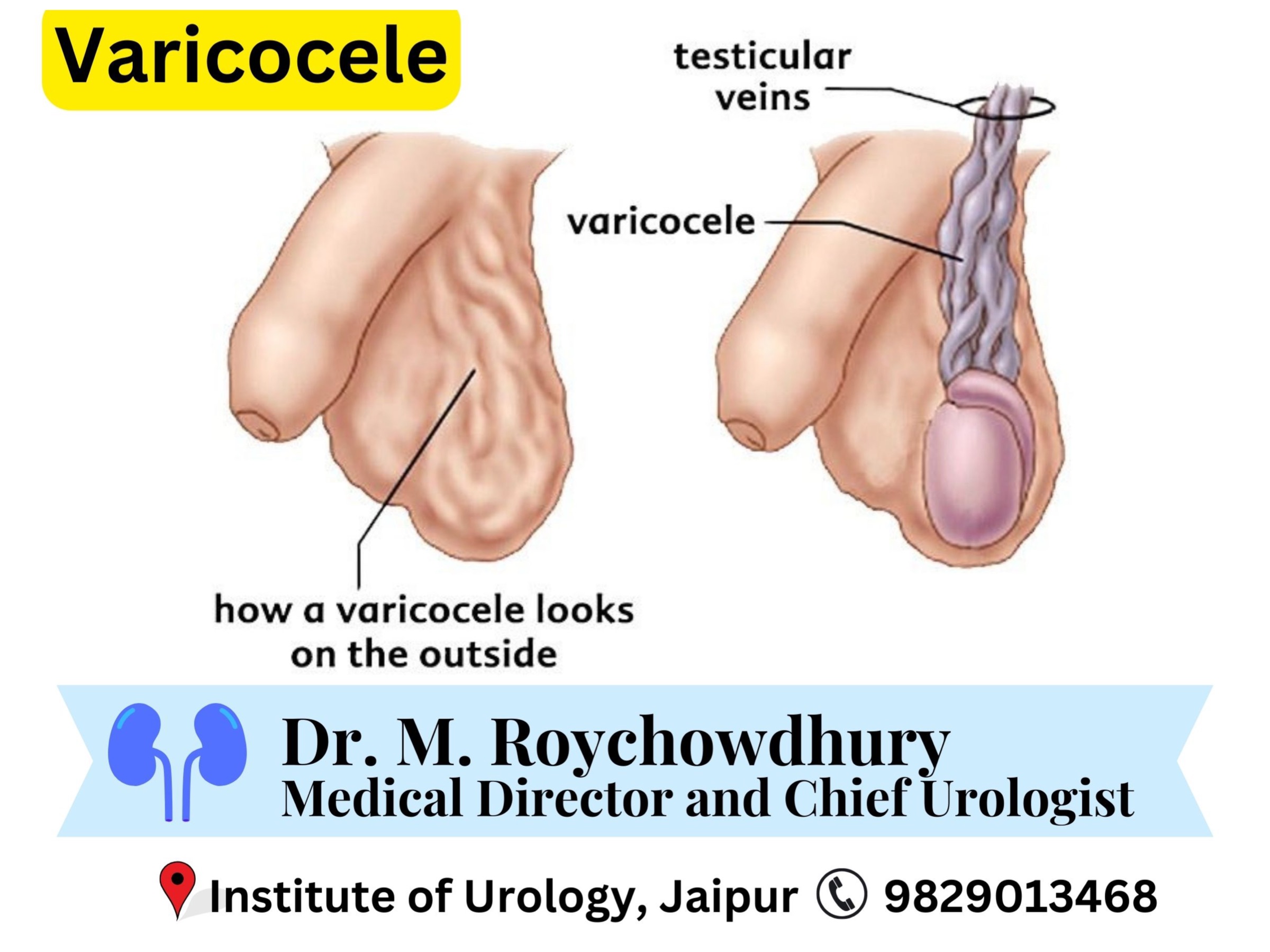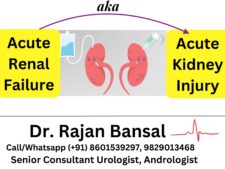Benign Prostatic Hyperplasia (BPH) Treatment in Jaipur: Benign prostatic hyperplasia (BPH) is a common condition that affects many men as they age. The treatment options for BPH depend on the severity of symptoms, the size of the prostate, and the overall health of the patient. Here are some of the most common treatment options for BPH that we usually adopt at Institute of Urology, C Scheme, Jaipur.

At this hospital, we have expert urologists which decades of experience and a highly competent staff accompanied by ultra modern technology and equipments to help you through all Men’s health and Urology related problems. Today, let’s talk about BPH treatment options that we offer-
Watchful waiting
Watchful waiting is a management strategy that may be recommended for men with mild to moderate symptoms of BPH (benign prostatic hyperplasia). The aim of this approach is to monitor the patient’s condition over time to see if their symptoms worsen or if they develop any complications.
During watchful waiting, we will likely recommend lifestyle changes, such as limiting fluids before bedtime, avoiding caffeine and alcohol, and exercising regularly. We may also advise you to avoid medications that can worsen BPH symptoms, such as decongestants and antihistamines.
We will schedule regular check-ups to monitor your symptoms and the size of your prostate gland. If your symptoms worsen or if you develop complications, such as urinary retention or kidney damage, we may recommend more aggressive treatment options, such as medication or surgery.
Watchful waiting may be a suitable option for patients who have mild to moderate symptoms of BPH and are not bothered by their symptoms. However, it’s important to keep in mind that BPH is a progressive condition, and symptoms may worsen over time. Therefore, it’s important to have regular check-ups with an expert urologist to monitor your condition and adjust your treatment plan if necessary.
Medical Management of BPH using Medicines at Institute of Urology, Jaipur
Medical management is a common treatment approach for BPH (benign prostatic hyperplasia). There are two main types of medications that can be used to manage BPH:
- Alpha blockers
- 5-alpha-reductase inhibitors.
Alpha blockers work by relaxing the muscles around the prostate gland, allowing urine to flow more easily. They can relieve symptoms such as difficulty starting urination, weak urine stream, and frequent urination. Some commonly prescribed alpha blockers include tamsulosin (Urimax), alfuzosin (Alfoo), silodosin (Silodol), and doxazosin.
5-alpha-reductase inhibitors work by blocking the conversion of testosterone to dihydrotestosterone (DHT), which is a hormone that can cause the prostate gland to grow. These medications can reduce the size of the prostate gland, improve urine flow, and relieve symptoms such as frequent urination and urinary urgency. The two 5-alpha-reductase inhibitors approved for BPH treatment are finasteride (Finas) and dutasteride (Dutas).
Combination therapy, which involves taking both an alpha blocker and a 5-alpha-reductase inhibitor, may also be used to manage BPH symptoms in some cases.
It’s important to note that medications can have side effects, so at our hospital, we will carefully evaluate your medical history and other medications you are taking before prescribing them. Common side effects of alpha blockers include dizziness, low blood pressure, and retrograde ejaculation, while 5-alpha-reductase inhibitors can cause decreased libido, erectile dysfunction, and breast tenderness. We will discuss the potential benefits and risks of medication with you and monitor you for side effects. We follow a very comprehensive approach where the patient is continually monitored and asked for concerns throughout the treatment journey.
Minimally invasive procedures
Minimally invasive procedures are a treatment option for BPH (benign prostatic hyperplasia) when medications do not improve symptoms or are not well-tolerated. These procedures use various methods to reduce the size of the prostate gland, improving urine flow and reducing symptoms.
Here are some of the minimally invasive procedures used to treat BPH:
- Transurethral microwave therapy (TUMT): This procedure uses microwave energy to heat up and destroy excess prostate tissue. A catheter with a microwave antenna is inserted through the urethra and into the prostate gland.
- Transurethral needle ablation (TUNA): This procedure uses radiofrequency energy to heat up and destroy excess prostate tissue. A catheter with needles is inserted through the urethra and into the prostate gland.
- Prostate artery embolization (PAE): This procedure blocks the blood supply to the prostate gland, causing it to shrink. A catheter is inserted through the groin and guided to the blood vessels that supply the prostate gland.
- Water vapor therapy (Rezum): This procedure delivers steam into the prostate tissue, causing it to shrink over time. A special device is inserted through the urethra and into the prostate gland.
- UroLift: This procedure involves the insertion of small implants that hold the enlarged prostate tissue out of the way, opening up the urethra and allowing urine to flow more freely.
Minimally invasive procedures for BPH are generally performed on an outpatient basis, and most patients experience minimal pain and can return to normal activities within a few days. We will help determine which procedure is right for you based on the size of your prostate gland and the severity of your symptoms. Because of highly sophisticated machines and equipments involved, these procedures are usually quite expensive.
Surgical Management of BPH at Institute of Urology, Jaipur
Surgical management is a more definitive treatment option for BPH (benign prostatic hyperplasia) when medications and minimally invasive procedures do not improve symptoms or are not appropriate. Surgery aims to remove excess prostate tissue and improve urine flow. Surgery is well accepted and it usually is able to get rid of the problem for life (follow ups as advised by the urologist are recommended).
Here are some of the surgical procedures used to treat BPH:
Laser prostatectomy: This procedure uses a laser to remove excess prostate tissue. It can be performed using different types of lasers, including holmium, thulium, and green light lasers. Laser prostatectomy requires regional anaesthesia and may have a shorter hospital stay and recovery time than TURP.
Transurethral resection of the prostate (TURP): This is the most common surgical procedure for BPH. A small instrument is inserted through the urethra and used to remove excess prostate tissue. TURP requires regional anesthesia and typically requires a hospital stay of one to two days.
Open prostatectomy: This procedure involves making an incision in the abdomen or between the anus and scrotum to remove excess prostate tissue. Open prostatectomy is typically reserved for very large prostates or if TURP is not feasible. These days, we do not prefer to perform open prostatectomy because we have much better outcomes with TURP and Laser techniques.
Currently, Laser Prostatectomy has emerged as the leading procedure for prostatatectomy as it has several benefits like reduced operating time, minimal blood loss, quicker recovery and shorter hospital stay. Also, with laser prostatectomy, we are able to operate on very large sized prostate (~200 g) in a single sitting. Before lasers, doctors used to do 2-3 different procedures to reduce the size of the prostate. But now, we have advanced laser technology that can reduce prostate in a single surgery which reduces hospital stay time as well as the costs involved with multiple procedures.
Best Doctor & Hospital for BPH Treatment in Jaipur – Institute of Urology, C Scheme, Jaipur
At Institute of Urology, C Scheme, Jaipur we are dedicated to patient’s health in the best way possible. We are a pioneer hospital for prostate treatments as we are the FIRST dedicated SINGLE SUPER SPECIALITY Hospital in Rajasthan, catering only to urology & other minimal access surgery. We have the first Advanced 100 WATT HOLMIUM LASER machine from world famous Lumenis for treatment of enlarged prostate & kidney stones. The VERSA PULSE POWER SUITE machine offers the highest power & widest range of activity, speed & precision to perform high-quality surgery. So far mode than 3500 Laser Prostatectomies have been performed at the Institute of Urology.
You can read more about our hospital HERE – Best Urology Hospital in Jaipur, Rajasthan.
We have successfully treated thousands of Local and Visiting patients suffering from Prostate problems, Kidney Stones and other Men’s health related problems. Remember, help is only a thought away. So, when treated the right way under correct expert guidance, prostate patients can lead a very healthy lifestyle along with a good sex life. For more queries or questions, I am available at 8601539297 (Dr. Rajan Bansal). You can also come and see me personally at the hospital between 9 a.m. to 7 p.m. Appointments can be booked on 9829013468.







